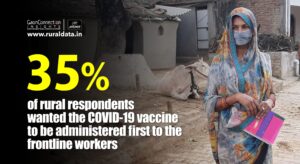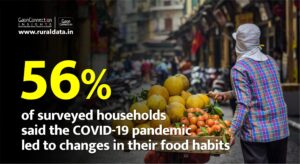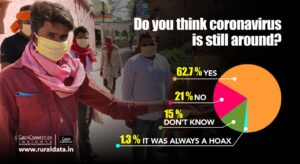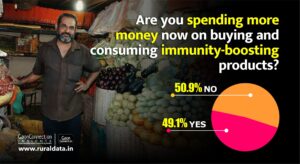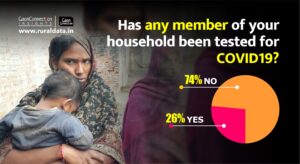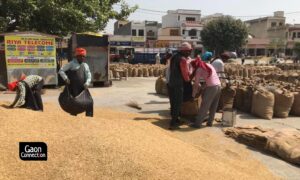Slightly more than half the residents of rural India think the coronavirus disease pandemic is a “conspiracy by China”, whereas another 22 per cent blame it on the failure of citizens to observe COVID-19 precautions. Less than one-fifth rural respondents — 18 per cent — see the ongoing pandemic as government failure.
Further, around one-fifth of the rural citizens think the coronavirus is no more around. A higher proportion of respondents in the West (25 per cent) and East-Northeast (23 per cent) zones did not think the COVID-19 virus was still around as compared to the North (18.5 per cent) and South (18.7 per cent) zones of the country. About 8.9 per cent respondents thought coronavirus disease was a rumour and 11 per cent respondents thought it was an exaggerated problem. Another 8.5 per cent thought it was a minor cold, cough and flu only.
These are among the key findings of the first of its kind survey on the perceptions of rural Indians around the coronavirus vaccine by Gaon Connection Insights, the data and insights arm of India’s biggest rural media platform Gaon Connection. The survey, released as ‘The Rural Report 3: COVID-19 Vaccine and Rural India’ is available in full for a free download on www.ruraldata.in
The face-to-face survey, conducted between December 1 and December 10, was carried out by Gaon Connection surveyors among 6,040 rural respondents across 60 districts in 16 states and one union territory. The selection of states, covering all regions of the country, was based on the prevalence of COVID-19 as per the COVID data of the Union ministry of health and family welfare, Government of India.
The survey had a margin of error of 5 per cent and a 95 per cent confidence level.
When asked what they thought COVID-19 was, 64 per cent of the respondents believed it was a disease, 9 per cent dismissed it as a rumour and 11 per cent called it an exaggerated problem. Eight per cent of the respondents called it a rich man’s disease, while 9 per cent looked upon it as an urban health issue. While 19 per cent of the respondents feared it to be fatal, 8.5 per cent considered it to be no more than a mild seasonal cold. Four per cent of the people said they were unaware of the pandemic.
The survey asked the people about the measures they took to prevent COVID-19, if they thought there was a need for a corona vaccine, if they would trust the efficacy of the vaccine, and more. The survey revealed the many doubts and misconceptions pertaining to COVID-19, in rural India.
As of December 21, 2020, COVID-19 has claimed the lives of at least 1.7 million people worldwide. In India, 9.98 million COVID-19 positive cases were reported, out of which, 1 lakh 46 thousand people lost their lives. The pandemic has led to massive economic losses, migration, livelihood crisis, and loss of employment, and many sectors are yet to recover even after several months of the unlock.
According to the World Health Organization, the first case of COVID-19 was reported from Wuhan City in China on December 8, 2019. The virus quickly spread worldwide and has taken the lives of 1.7 million people by December 21, 2020. Out of the casualties, 4,634 people were from China. In India, so far, one lakh 46 thousand have succumbed to the virus.
China was accused of spreading the virus and withholding the actual number of its patients and several countries referred to it as a Chinese conspiracy. However, according to a BBC report, the scientists from the US Centres for Disease Control and Prevention (CDC) believed that SARS-CoV-2, the virus responsible for spreading COVID-19 disease, did not originate in China.
The test
The survey revealed that almost every fourth household in rural India (25.9%) had one of its members tested for COVID-19.
In the high COVID-19 prevalence states (Maharashtra, Karnataka, Kerala, Andhra Pradesh and Arunachal Pradesh), almost every third household (34.6%) had a member tested for corona. In the medium-prevalence states (Assam, Haryana, Punjab, Odisha, Jammu and Kashmir, Himachal Pradesh, West Bengal) 28.4 percent of households had been tested. In states with low corona prevalence (Bihar, Jharkhand, Uttar Pradesh, Madhya Pradesh, Gujarat), only 16.6 per cent of households had undergone corona tests.
Members of 59 per cent of the households involved in the survey (1567 out of the total 6044), had been declared COVID-19 positive upon testing. In the worst-hit states, 78.4 per cent of households recorded a positive case, while in the least affected states it was 38.6 per cent of the households with someone testing positive. Three out of every four or 72.2 per cent of the affected people had fully recovered,15.8 per cent recovered partially, 8.1 per cent were still trying to recover, and 3.5 per cent had died.
Faith in the government system
People afflicted with COVID-19 relied more on government hospitals and systems. During the survey, the corona positive members of 73 per cent of the surveyed households (919) had admitted themselves to government quarantine centres while 27 per cent had remained in isolation at home. Forty eight per cent of those who had stayed home took allopathic medicines, while 29 per cent used immunity boosters (Chyavanprash, Giloi, honey, etc.) and 13 per cent used home remedies.
Votes for a free vaccine
Nearly half (46.5 per cent) of rural India said they will vote for the political party that provided them the corona vaccine for free. Fifty per cent of the respondents believed the vaccine of Indian companies to be more reliable and 44 per cent were willing to pay for corona vaccination (two doses at Rs 1,000 and.
Read the detailed report on www.ruraldata.in.








